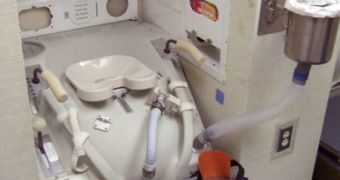After the hick-ups it has experienced after it was installed in the orbital lab, the toilet aboard the International Space Station is about to undergo serious testing over the next two weeks, as more than three times the usual number of astronauts will be using it regularly. These tests are critical, because, come May, the station's average crew will double in size, and the facility will host 6 astronauts instead of three.
However, despite their importance, NASA mission planners have had to renounce a massive trial during the 13-day Discovery mission, because the original plans have been shortened by one day. Flight control officials have told Space that the testing of the new toilet will have to wait until the repairs to the urine recycling system and the water dispenser are completed.
The need to test the “bathroom” is still paramount, because of the large number of astronauts that will inhabit the orbital facility starting late May.
The Discovery shuttle has also brought new vital pieces needed for the urine recycling system to the ISS, and the joint crews hope to be able to fix the glitches within the time frame of the current mission. The seven astronauts that now visit the station have also delivered some advanced equipment, designed to help them get rid of the bacteria that have found a home in the lab's water dispenser.
NASA experts have deemed it necessary to fix the recycling system before taking the toilet test, despite the fact that the three members of the ISS crews have been sent a recording of the new installation. In a recent video tour of the new bathroom, station commander Michael Fincke told the visiting astronauts that, “You guys are going to get to try it out,” which, indeed, was the case at the time.
Still, the delay that has plagued the STS-119 mission for more than a month means that the actual duration of the docking time needs to be shortened. An extra day of activities (the 14th), a spacewalk, as well as the toilet test are among the items removed from the schedule.
The members of the ISS crew will have a delicate task when their replacements arrive on a Russian Soyuz craft in early April, as they will have to teach them how to use the orbital toilet without the aid of gravity. Fans and airflows are the only things that guide wastes to their disposal sites, and every “step” in the process needs to be made by the book.

 14 DAY TRIAL //
14 DAY TRIAL //